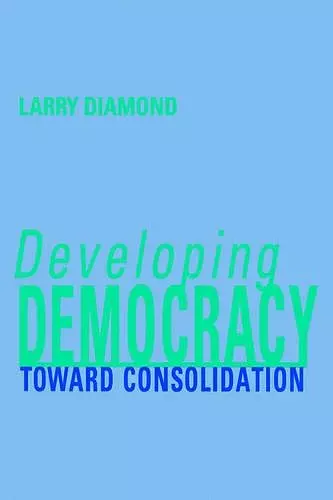Developing Democracy
Toward Consolidation
Format:Paperback
Publisher:Johns Hopkins University Press
Published:7th May '99
Should be back in stock very soon

Larry Diamond has written the authoritative book on the democratic experience-lucid and discriminating in its theoretical grasp, and masterful in its presentation of evidence. -- Gabriel A. Almond, Stanford University Larry Diamond has built a cumulative record of outstanding scholarship on democracy. This book flows logically from his earlier contributions. It illuminates brilliantly the problems and opportunities of emerging democracies, especially the critical phase of democratic consolidation. In a world struggling to find ways of establishing durable democracies, this book is at once a timely and fundamental contribution. -- David A. Hamburg, M.D., President Emeritus, Carnegie Corporation of New York Larry Diamond's Developing Democracy: Toward Consolidation is for our time the definitive assessment of the third wave of democratization that began in 1974. It is comprehensive in its research, penetrating in its analysis, and balanced in its judgments. Diamond highlights both the progress that has been made and yet the extent to which so many new democracies are illiberal 'hollow democracies.' Making full use of the recent immense literature on democratization, he persuasively analyzes the impact of economic growth, decentralization, political culture, and civil society on the prospects for the consolidation of third wave democracies and for a fourth wave of democratic development. This is an indispensable volume for both scholars of democracy and promoters of democratization. -- Samuel P. Huntington, Weatherhead Professor of Government and director of the OlinInstitute for Strategic Studies, Harvard University This book is a splendid tour de force. Diamond commands and skillfully organizes an amazing amount of knowledge and information, while at the same time discussing, in a subtle and penetrating but also very readable manner, the complex theoretical issues raised by processes of democratization, East and South. Clearly, this book is the product not only of great talent and dedication but also of deep personal commitment to the humane values that, as Diamond persuasively argues, undergird the emergence and the expansion of democracy. This is an indispensable book for practitioners, scholars, and students of democracy and democratization; they will find in it not only illuminating analyses of past and ongoing processes but also careful arguments against facile conformism about the present situation and the prospects of many of the emerging democracies. -- Guillermo O'Donnell, Helen Kellogg Professor of Government, University of Notre Dame, Fellow of the American Academy of Arts and Sciences, Formerly (1982-1997) Academic Director of the Kellogg Institute for International Studies, University of Notre Dame, Formerly (1988-91) President of the International Political Science Association
The book concludes with a hopeful view of the prospects for a fourth wave of global democratization.In this book noted political sociologist Larry Diamond sets forth a distinctive theoretical perspective on democratic evolution and consolidation in the late twentieth century. Rejecting theories that posit preconditions for democracy-and thus dismiss its prospects in poor countries-Diamond argues instead for a "developmental" theory of democracy. This, he explains, is one which views democracy everywhere as a work in progress that emerges piecemeal, at different rates, in different ways and forms, in different countries. Diamond begins by assessing the "third wave" of global democratization that began in 1974. With a wealth of quantitative data and case illustrations, he shows that the third wave has come to an end, leaving a growing gap between the electoral form and the liberal substance of democracy. This underscores the hollow, fragile state of many democracies and the imperative of concolidation. He then defines the concept of democratic consolidation and identifies the conditions that foster it. These include strong political institutions, appropriate institutional designs, decentralization of power, a vibrant civil society, and improved economic and political performance. If new and troubled democracies are to be consolidated, Diamond argues, they must become more deeply democratic-more liberal, accountable, and responsive to their citizens. Drawing on extensive public opinion research in developing and postcommunist states, he demonstrates the importance of freedom, transparency, and the rule of law for generating the broad legitimacy that is the essence of democratic consolidation. The book concludes with a hopeful view of the prospects for a fourth wave of global democratization.
[A] systematic account of the political realities that make democracy promotion so challenging. Diamond... marshals an impressive array of cross-cultural social-science evidence. -- Charles Lane Weekly Standard Offers a realistic description of the political discontents of our time and how these discontents are reduced... by the development of democratic practice. Washington Times
ISBN: 9780801861567
Dimensions: 229mm x 152mm x 20mm
Weight: 522g
384 pages